Thinking about earning two graduate degrees at once? A double master’s degree—also known as a dual or combined master’s—can fast-track your career, expand your expertise, and open doors across industries. In this in-depth guide, you’ll learn what it is, how it works, and whether it’s the right choice for your goals in 2025 and beyond.
Introduction to Double Master’s Degrees
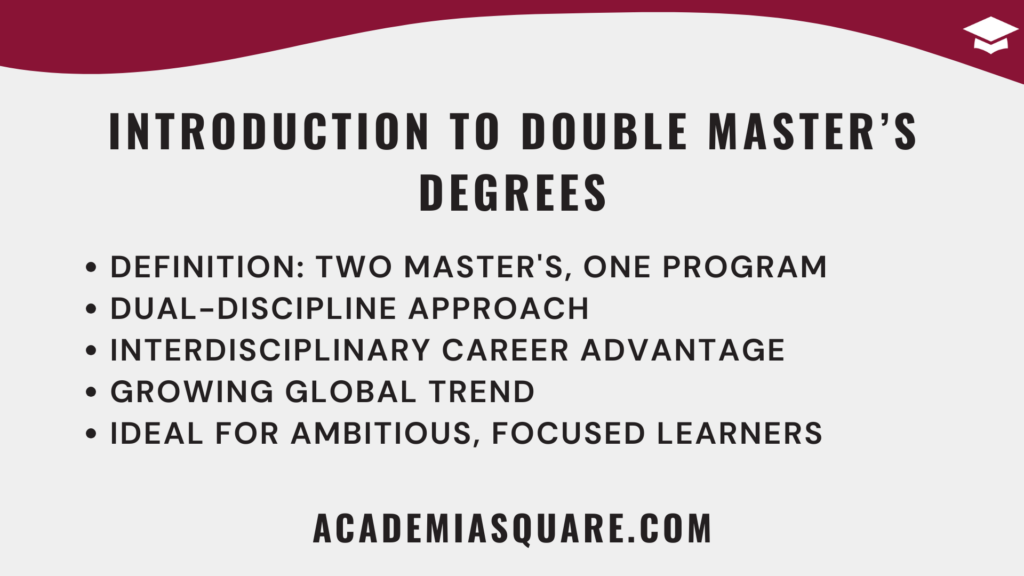
The landscape of higher education is evolving rapidly, and one of the most compelling developments is the rise of the double master’s degree. As students face an increasingly competitive global job market, many are looking for ways to stand out, deepen their expertise, and broaden their career prospects. Enter the double MA—or double master’s—program: an intensive academic path that results in two advanced degrees, often from different fields or institutions, within a condensed timeframe.
This guide explores everything you need to know about double master’s degrees, starting with what they are and how they differ from similar educational models. Whether you’re a recent graduate, a working professional, or someone considering a career change, understanding this educational format could open new doors you hadn’t considered before.
What Is a Double Master’s Degree?
A double master’s degree program allows students to earn two graduate degrees either simultaneously or sequentially, often in less time than it would take to pursue each degree independently. These programs are usually structured through partnerships between two universities—or two departments within the same institution—providing a unique interdisciplinary education.
In many cases, the degrees are complementary, such as a Master of Business Administration (MBA) paired with a Master of Public Health (MPH), or a Master of Science (MS) in Engineering with a Master of Arts (MA) in International Policy. This combination empowers students with both technical and contextual understanding of complex global issues.
Double Master’s vs. Dual Degree vs. Joint Degree
While often used interchangeably, these terms have distinct meanings:
- Double Master’s Degree: Two separate master’s degrees, awarded upon completion of two curricula, usually with some overlapping credits.
- Dual Degree Program: A broader category that may include undergraduate/graduate combinations or master’s/PhD pairings.
- Joint Degree: A single program that leads to one degree, but combines two fields (e.g., JD/MBA). Typically, only one diploma is issued.
The double master’s option is generally more rigorous but offers distinct advantages, including full recognition of both qualifications and the ability to enter multiple professional arenas post-graduation.
Why Are Double Master’s Programs Gaining Popularity?
There are several reasons why these programs are trending globally. One key factor is the rising demand for interdisciplinary skills. Employers increasingly seek candidates who can navigate complex problems through both analytical and contextual lenses. A double MA can equip you with this versatility.
Moreover, many universities have recognized this demand and responded with more structured offerings. According to data from the European University Association and U.S. graduate schools, applications to dual and joint master’s programs have risen by more than 15% in the last five years.
Who Should Consider a Double Master’s Degree?
While appealing, a double master’s degree isn’t for everyone. This path demands intense focus, excellent time management, and a clear understanding of long-term goals. It’s best suited for:
- Professionals transitioning between industries (e.g., tech to policy, or business to sustainability)
- Students aiming for academic or research careers in hybrid fields
- High-achievers seeking leadership roles in multidisciplinary sectors
If you find yourself at the intersection of two disciplines and have the stamina for a demanding academic journey, a double master’s program could be your ideal launchpad.
Benefits of Pursuing a Double Master’s Degree
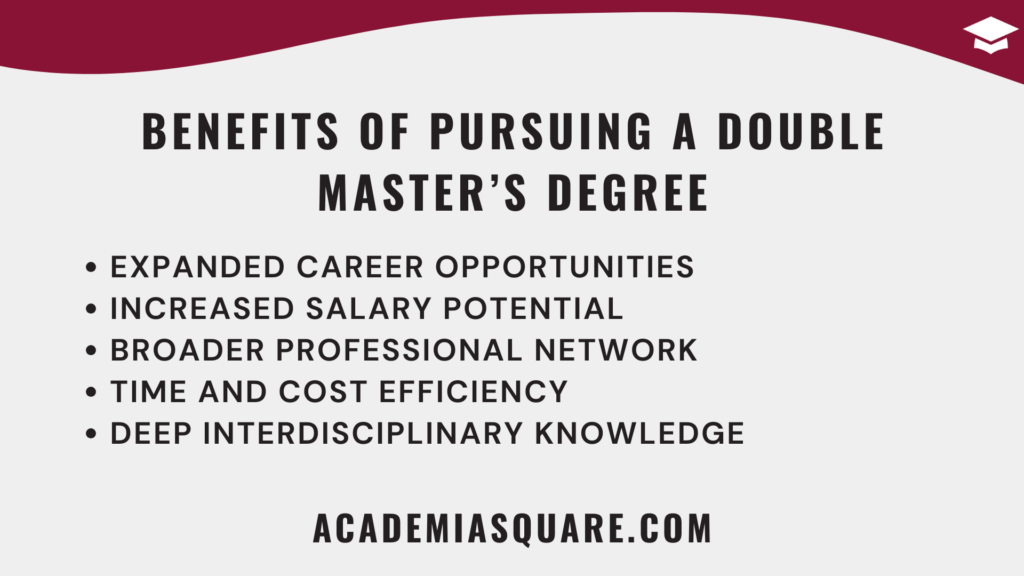
Choosing to pursue a double master’s degree is a bold move—but one that can yield significant professional and personal rewards. This academic path is not only about gaining two diplomas; it’s about developing a multi-faceted skill set that sets you apart in a global job market increasingly shaped by complexity and interdisciplinarity.
Enhanced Career Opportunities
One of the most obvious benefits of a double MA is access to a broader range of career options. For instance, combining a Master’s in Data Science with a Master’s in Business Administration opens doors in both technical and executive roles. This dual qualification signals to employers that you’re adaptable and equipped to bridge gaps between teams, industries, and cultures.
- Cross-functional leadership roles in multinational companies
- Interdisciplinary research positions at top universities or think tanks
- Higher salaries compared to peers with a single specialization
Broader Professional Network
By enrolling in a double master’s program—especially one involving two universities—you gain access to multiple alumni networks, faculty mentorships, and institutional partnerships. This creates a broader ecosystem of career connections and research collaborations. According to a QS Global Education Report, graduates with dual academic affiliations are 35% more likely to secure international job placements.
Time and Cost Efficiency
While it might seem counterintuitive, double master’s degrees can be more cost-effective than pursuing two separate programs sequentially. Many institutions allow shared credit hours between degrees, reducing both tuition and the time spent in school.
Let’s compare:
- Traditional Path: 4 years total (2 years per degree), full tuition twice
- Double Master’s: 2.5 to 3 years, shared coursework, one admission cycle
Deeper, Broader Knowledge
A double master’s program forces you to master multiple modes of thinking. This intellectual stretch often leads to stronger problem-solving abilities, creative thinking, and innovation. Employers and academic institutions alike value candidates who can connect the dots between disciplines.
Simply put, you don’t just learn more—you learn smarter.
Challenges and Considerations
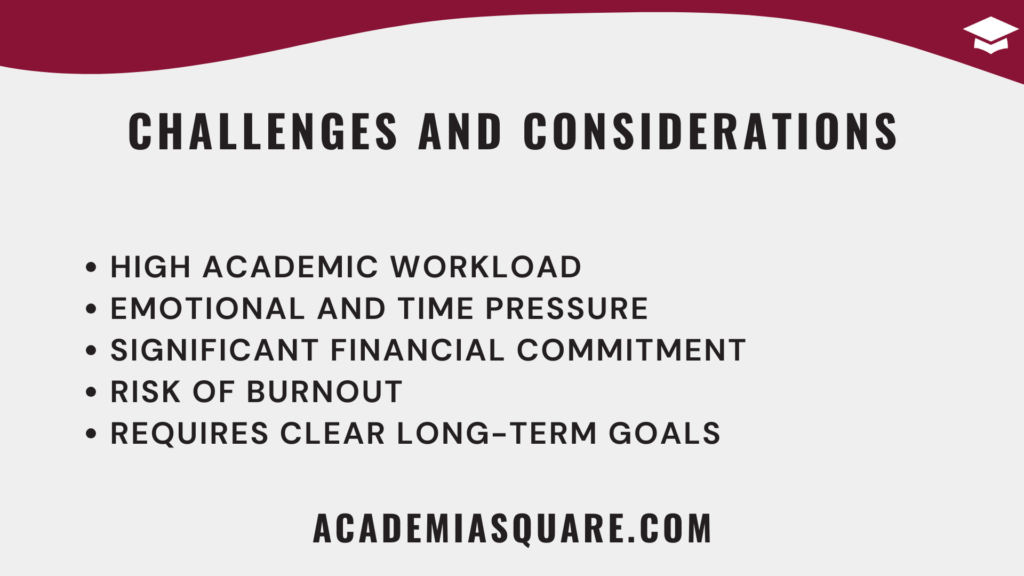
While the advantages of a double master’s degree are compelling, it’s equally important to weigh the challenges. These programs aren’t for the faint of heart. They demand commitment, resilience, and a strategic approach to time and energy.
High Academic Workload
Double MA programs often compress two years of study per degree into a combined 2.5–3-year format. This means longer semesters, tighter deadlines, and more intensive reading and project loads. If you’re not well-organized or self-disciplined, the stress can quickly become overwhelming.
- Expect to handle 30–40% more coursework per term compared to a single master’s
- Frequent cross-discipline assessments and mixed-format exams
- More group work, often across different academic cultures
Emotional and Physical Burnout
Academic pressure, especially when compounded by internships or part-time work, can lead to burnout. Students often underestimate the toll of juggling two fields at once. If you’re moving to another country for the program, you also need to navigate cultural adaptation and potential visa complications.
Financial Pressure
Although a double degree can be more economical in the long run, the up-front cost is still significant. Housing, materials, travel between campuses (if cross-institutional), and daily living expenses can add up—particularly if you’re unable to work part-time due to your course load.
Pro tip: Create a multi-year budget in advance, factoring in not just tuition but living and contingency costs.
Risk of Diluted Expertise
With your attention divided between two disciplines, there’s a risk you may not gain the same level of depth as someone fully immersed in a single field. This is especially critical in research-heavy or highly technical areas. Some employers or academic committees may prefer depth over breadth, depending on the role.
Choosing a double master’s program should never be a shortcut—it’s a deliberate, demanding journey. But for the right student, the long-term return can be worth the immediate sacrifices.
Top Fields Offering Double Master’s Programs

Not all disciplines are equally suited for a double master’s degree. However, certain fields naturally complement each other, offering fertile ground for interdisciplinary education. Choosing a strategic pairing can maximize both your learning experience and your career potential.
Business and Public Policy
One of the most popular combinations involves an MBA (Master of Business Administration) and a Master of Public Policy (MPP) or Public Administration (MPA). This pairing is ideal for students aiming for executive roles in government, NGOs, or international organizations.
- Develops both analytical and managerial skills
- Ideal for careers in urban planning, sustainability, or policy consulting
Engineering and Management
This double MA pairing is common among students who want to move beyond technical roles and into leadership positions. For example, combining an MS in Mechanical Engineering with a Master’s in Technology Management prepares graduates to oversee both design and implementation processes in tech-driven industries.
Law and International Relations
For those interested in diplomacy, global trade, or human rights law, combining a Juris Doctor (JD) or LLM with a Master’s in International Relations can offer a powerful credential. These programs are often offered in partnership between law schools and political science departments.
Data Science and Health Sciences
The integration of technology in medicine has led to programs that combine bioinformatics, data science, and public health. These double master’s degrees equip students to work on predictive analytics, digital diagnostics, and health tech startups.
Design and Social Innovation
For creative professionals, blending a Master of Fine Arts (MFA) or MA in Design with studies in Social Innovation or Entrepreneurship can lead to impactful careers in community-driven design, policy innovation, and ethical business models.
These are just a few of the highly sought-after double master’s degree programs shaping the future of work and academia. The key is choosing a combination that not only aligns with your interests but also meets real-world demands in your target industry.
Global Universities with Renowned Double Master’s Programs

Choosing the right institution is critical when pursuing a double master’s degree. While many universities now offer interdisciplinary programs, only a select few have truly international, well-structured, and employer-recognized dual-degree offerings. These institutions often collaborate with one another or partner across continents, providing a rich academic and cultural experience.
Top U.S. Institutions Offering Double Master’s Programs
The United States remains a global hub for graduate education. Prestigious universities like Harvard, Stanford, and the University of Michigan offer interdisciplinary double master’s tracks combining business, law, science, and public policy.
- Harvard University: MPP/MBA dual-degree through the Kennedy School and Harvard Business School
- University of Pennsylvania: JD/MBA and MD/MPH programs via Wharton and other schools
- MIT: Leaders for Global Operations (LGO) – a dual degree in engineering and management
These programs are often competitive but come with robust alumni networks, cutting-edge research opportunities, and global recognition.
Leading European Universities for Double Master’s Degrees
In Europe, many universities have adopted the Bologna Process framework, which simplifies credit transfers and collaborative programs. France, Germany, and the Netherlands are at the forefront of double MA offerings, especially those taught in English.
- Sciences Po (France): Partners with LSE, Columbia, and Freie Universität Berlin for joint MAs in Public Policy and International Affairs
- ETH Zurich (Switzerland): Offers integrated tech-management programs with strong industry ties
- Erasmus University Rotterdam: Double degrees in economics and data science in collaboration with TU Delft
Asian and Global Collaborations
Asian institutions are increasingly joining global partnerships. Tsinghua University (China), the National University of Singapore (NUS), and the Indian Institute of Management (IIMs) now offer double master’s degrees in collaboration with Western universities.
Example: The NUS MBA-MPA dual degree with Lee Kuan Yew School of Public Policy is widely recognized across Asia-Pacific for producing future leaders in government and business.
Whether you want academic prestige, global exposure, or industry access, the institution you choose should align with your goals—and offer structural support for your dual journey.
Application Process and Requirements
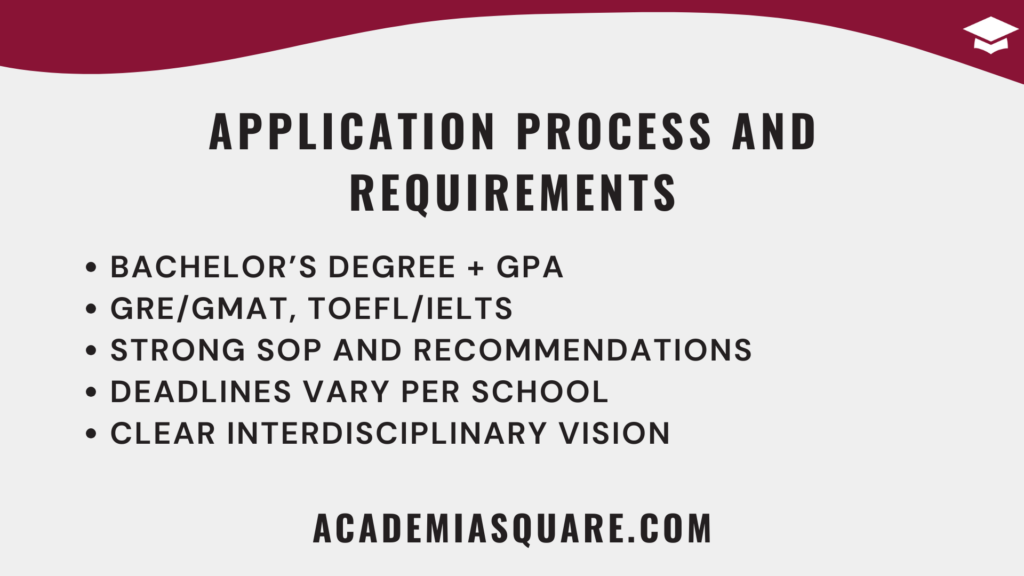
The application process for a double master’s degree is more complex than applying for a single program. You’re essentially preparing to enter two academic departments—sometimes at two separate institutions—each with its own standards and prerequisites. Strong planning and attention to detail are essential.
Understanding Program Structure
Before applying, clarify whether the double MA program is:
- Internal: Offered by a single university, across two departments (e.g., MBA + MS in Data Science)
- External: A joint initiative between two separate universities (often in different countries)
Internal programs typically have one joint application. External programs may require you to apply separately to each institution—sometimes in different academic cycles.
Standard Admission Requirements
Most double master’s programs ask for:
- Bachelor’s degree (often with a GPA minimum, e.g., 3.0 or above)
- GRE or GMAT scores (depending on discipline)
- Language proficiency tests (TOEFL, IELTS) if applicable
- Two or more letters of recommendation
- A statement of purpose that clearly justifies your interdisciplinary goals
Your personal statement is especially critical—it must convincingly explain why the two degrees make sense together, how they align with your career goals, and why the institution(s) are the right fit.
Tips for a Successful Application
Applying for a double degree is not just about credentials—it’s also about cohesion. Admissions committees want to see that you’re not simply collecting degrees, but pursuing a coherent educational path.
- Customize each SOP: Avoid generic writing. Tailor your essays to highlight why the combination of disciplines matters.
- Show leadership and collaboration: Double MA programs often involve interdisciplinary teamwork. Show evidence of these soft skills.
- Start early: Application timelines may differ for each component program. Plan your references and test dates accordingly.
Finally, keep in mind that admissions for double master’s degrees can be highly selective—especially for global partnerships. Your application must present a compelling, future-focused narrative.
Duration and Curriculum Structure
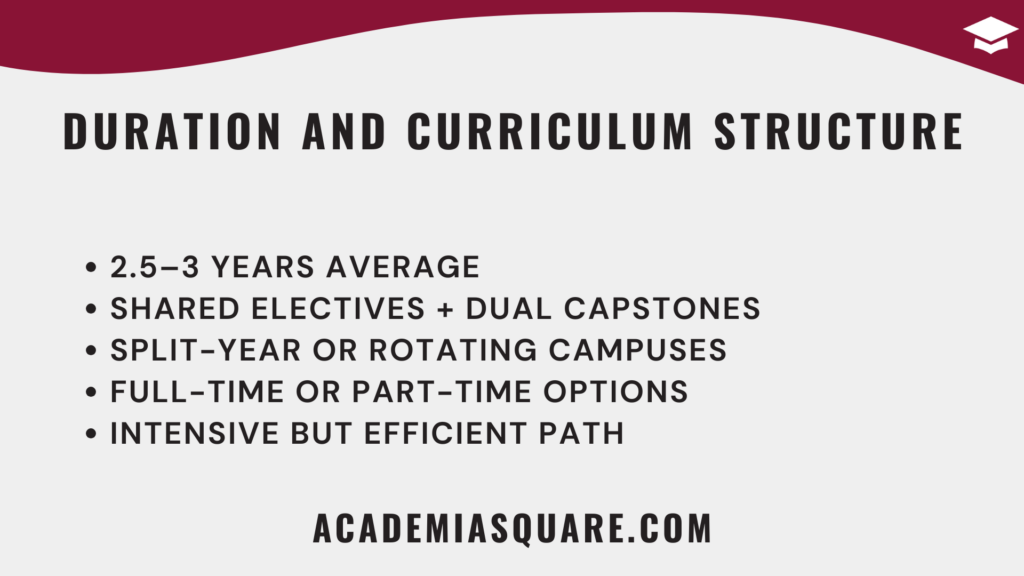
A key advantage of the double master’s degree model is efficiency—but that doesn’t mean it’s easy. These programs are designed to compress what would normally be four years of study into roughly 2.5 to 3 years, without sacrificing depth or academic rigor. Understanding how the curriculum is structured will help you plan and thrive during your studies.
Typical Duration of Double Master’s Programs
Most double MA programs span:
- 2 to 3 years full-time, depending on the overlap of courses and the institutions involved
- Up to 4 years part-time for working professionals or online/hybrid learners
For example, a JD/MBA or MPA/MSc combo often takes 36 months, while programs with significant course overlap may conclude in 24 months.
How Curriculum Is Split Between Degrees
The curriculum in double master’s programs is typically divided into:
- Core Modules: Required courses in each field (e.g., Finance, Public Health)
- Shared Electives: Courses that count toward both degrees—like Ethics, Leadership, or Data Analytics
- Capstone Projects or Theses: Often interdisciplinary, supervised by advisors from both fields
This structure allows students to explore intersections between disciplines—such as how machine learning influences public policy or how psychology informs marketing.
Study Abroad and Campus Switching
For double master’s degrees across two institutions, you may alternate semesters or years at each university. This adds a global learning dimension but requires additional planning for visas, housing, and course continuity.
- Split Year Format: Year 1 at home university, Year 2 abroad
- Blended Semesters: Switching campuses every term (common in EU partnerships)
Academic Support Systems
Because of the program’s intensity, strong academic advising is crucial. Leading double MA programs typically offer dual academic advisors, career coaching, and flexible internship timing. Be proactive in using these resources—students who do tend to complete their programs faster and with stronger outcomes.
The curriculum structure of a double master’s degree is designed to challenge you—and prepare you for the complexity of the real world. Success depends not only on intelligence, but strategy, adaptability, and endurance.
Financial Aspects and Funding Opportunities
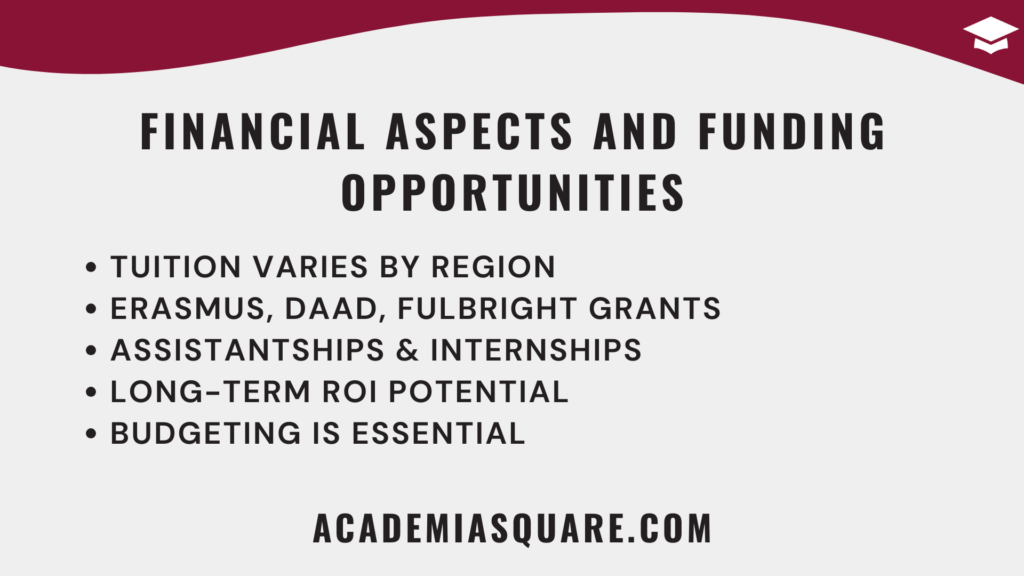
Pursuing a double master’s degree is a significant investment, not just of time and energy, but also of money. While these programs can be more efficient than two separate degrees, the up-front costs can be intimidating. Fortunately, a variety of financial aid options, scholarships, and budgeting strategies can make your academic journey more affordable.
Tuition and Associated Costs
The cost of a double MA varies widely depending on geography, program structure, and institutional prestige. In the U.S., tuition alone can range from $40,000 to $120,000+ for the entire program, while in Europe or Asia, the costs may be significantly lower—especially in publicly funded institutions.
- Private U.S. institutions: $70,000–$150,000
- Top EU universities: €15,000–€40,000 (often lower for EU citizens)
- Living expenses: $1,000–$2,000/month depending on location
Besides tuition, remember to account for visa fees, insurance, travel between campuses, materials, and tech (e.g., laptops, subscriptions, software).
Scholarships and Grants
Many universities offer internal funding specifically for interdisciplinary or double-degree students. Some examples include:
- Erasmus Mundus Joint Master Degrees: Full scholarships for EU and non-EU students in double MA programs
- DAAD (Germany): Scholarships for international students in joint or dual-degree programs
- Fulbright and Chevening: National-level funding for double MA studies abroad
Additionally, merit-based and need-based aid may be available through each institution separately. Apply early, as funding windows often close well before program deadlines.
Assistantships, Fellowships, and Part-Time Work
In some programs, especially in North America, you can offset costs through:
- Graduate Assistantships: Paid research or teaching roles that reduce tuition
- Paid Internships: Some double MA programs include internships that provide stipends or course credit
- Campus jobs: Positions in libraries, student services, or academic departments
Be sure to verify visa regulations for part-time work if you’re an international student.
Long-Term Return on Investment (ROI)
While the upfront cost is considerable, a double master’s degree can significantly increase your earning potential and employability. According to a 2023 QS survey, graduates of interdisciplinary master’s programs earn 18–35% more over 10 years compared to their single-degree counterparts.
The key is to evaluate your ROI not only in salary terms, but also in career mobility, access to international markets, and lifelong learning opportunities.
Career Outcomes
One of the most compelling reasons to pursue a double master’s degree is the long-term impact on your career. Graduates from double MA programs often find themselves in leadership roles, working across disciplines, industries, and borders. These degrees serve as springboards into high-growth sectors and prestigious employers.
Typical Career Pathways After a Double MA
Depending on your degree combination, career paths can vary—but most graduates land in roles that require both specialization and cross-functional skills. Common examples include:
- Management Consultant with a business + data science background
- Global Health Policy Analyst with public health + international relations
- UX Strategist combining design + behavioral science
- AI Ethics Researcher with law + computer science
These interdisciplinary roles are increasingly in demand in organizations like the United Nations, McKinsey, Google, WHO, and major universities.
Higher Earning Potential
A double master’s doesn’t just make you more marketable—it can make you wealthier. Reports from PayScale and the Graduate Management Admission Council (GMAC) indicate that double MA holders earn:
- 15–25% higher starting salaries in the first 3 years post-graduation
- Faster promotions into mid- and senior-level positions
- Better mobility: Easily switch between industries (tech to consulting, for example)
Online and Part-Time Double Master’s Options
As remote education technologies have matured, many universities now offer double master’s degrees online or in part-time formats. These flexible alternatives are ideal for working professionals, parents, or students who can’t relocate or pause their careers for full-time study.
Who Should Consider Online or Part-Time Double MAs?
If you’re managing a full-time job or personal responsibilities, an online or hybrid format may be your best path to advanced qualifications. These programs are especially well-suited for:
- Professionals in mid-career seeking promotion or industry transition
- Entrepreneurs who need immediate application of what they learn
- Students in remote regions without access to top universities
Notable Online Double Master’s Programs
Some of the most respected institutions have launched accredited online double MA programs:
- Georgia Tech: MS in Analytics + Online MBA
- IE Business School (Spain): Dual degree in Digital Business & International Relations
- University of London: Double master’s with tracks in global development and law
These programs typically offer asynchronous learning, live Q&A sessions, and virtual group projects to mimic real-time collaboration.
How Flexible Are These Formats?
Most online or part-time double master’s programs allow extended timelines of up to 4–5 years. This enables students to:
- Take fewer courses per semester
- Pause during work peaks or life events
- Balance academic and professional obligations
However, students should be self-directed and disciplined. There’s often less hand-holding than in traditional programs.
Things to Watch Out For
Not all online programs are created equal. When choosing a double MA online, verify:
- Accreditation: Regional/national recognition is critical for employment and further education
- Reputation: Research employer recognition of the degree
- Student support: Access to advisors, career services, and alumni networks
Done right, a double master’s degree online can be just as powerful as its on-campus counterpart—offering maximum impact with minimal disruption.
Double Master’s vs. Two Separate Master’s Degrees
One common question students ask is whether it’s better to pursue a double master’s degree through an integrated program—or to complete two separate master’s degrees over time. While both approaches can enhance your credentials, they come with distinct trade-offs in terms of time, cost, and strategic advantage.
Efficiency and Time Commitment
The most immediate difference is time. Double MA programs are designed to allow overlapping credits, reducing the overall duration.
- Double Master’s: Typically 2.5–3 years full-time
- Two Separate Master’s: Usually 4 years or more, including application gaps and transitions
If your goal is to accelerate your academic and professional progress, the double master’s route is more efficient by design.
Cost Comparison
Financially, completing two master’s programs separately means paying full tuition twice—often at different institutions. A double MA, on the other hand, offers shared coursework, one application cycle, and potentially lower living costs due to a shortened timeline.
Example: A standalone MBA + MPA could cost $120,000–$160,000. A combined dual-degree option may cost $80,000–$100,000, depending on the school and region.
Academic Integration and Flexibility
One benefit of doing two separate degrees is the flexibility to shift focus between programs or even change institutions. This allows more time for reflection and course correction. However, double MA programs offer a curated curriculum designed for interdisciplinary depth, with better academic cohesion and a more synchronized learning experience.
Employer Perception
Employers tend to view double master’s degrees favorably, especially when the program comes from top institutions and reflects a logical, well-integrated skill set. However, holding two unrelated master’s degrees—completed years apart—can sometimes raise questions about focus and consistency unless clearly explained.
- Integrated Double MA: Seen as strategic, rigorous, and efficient
- Separate MAs: Can show evolution or adaptability—but may lack synergy
Ultimately, the right path depends on your career objectives, financial capacity, and learning style. But if you’re looking for an efficient, cohesive, and respected way to gain interdisciplinary expertise, a structured double master’s degree is often the superior choice.
Is a Double Master’s Degree Right for You?
Not everyone is cut out for a double master’s degree—and that’s perfectly okay. These programs require more than academic readiness; they demand clarity of purpose, resilience, and a long-term mindset. Before applying, it’s worth conducting an honest self-assessment.
Key Questions to Ask Yourself
- Do I have a clear career goal that spans two disciplines?
- Can I handle a rigorous academic schedule for 2–3 years?
- Am I financially prepared—or willing to seek scholarships and aid?
- Do I thrive in fast-paced, high-pressure environments?
- Am I interested in working internationally or in complex industries?
If most of your answers lean toward “yes,” a double MA could be a transformational opportunity. If you’re unsure, it might be better to start with a single degree and evaluate options later.
Personality Fit and Learning Style
Double master’s programs tend to reward learners who are:
- Self-motivated: You’ll be juggling two sets of expectations and timelines
- Strategic thinkers: The best candidates can link concepts across disciplines
- Collaborative: Many assignments involve interdisciplinary teams
- Resilient: Setbacks happen—grit matters
Alternatives to Consider
If a full dual degree isn’t feasible, you still have options:
- Single master’s + graduate certificate in a secondary field
- Interdisciplinary master’s (one degree, blended focus)
- Professional experience + executive education in a complementary field
These routes offer increased flexibility while still diversifying your skill set. They’re especially valuable if time or cost is a major concern.
Final Thoughts
A double master’s degree isn’t just a credential—it’s a long-term strategy. If your ambitions lie at the intersection of disciplines, and you’re ready to invest in a high-effort, high-reward journey, this path can deliver incredible returns.
It’s not about doing more—it’s about doing what matters most, with focus, depth, and purpose.
FAQs – Double Master’s Degree Programs
What is a double master’s degree?
A double master’s degree, also called a dual master’s, is a graduate-level program that allows students to earn two master’s degrees simultaneously, often in related or complementary fields. These programs are designed to save time and offer interdisciplinary expertise. Universities like MIT and Columbia offer structured dual degree pathways with integrated curricula.
How long does it take to complete a double master’s program?
Most double master’s degree programs take between 2.5 to 3 years to complete full-time. This is shorter than pursuing two separate degrees, which can take 4 years or more. Some universities offer part-time or online versions that extend the duration up to 5 years.
Is a double master’s degree worth it?
A double master’s degree can significantly boost your career prospects, offering access to interdisciplinary roles and higher salaries. According to a 2023 QS report, dual-degree graduates earn 15–35% more than single-degree holders over the course of a decade.
What are the admission requirements for double master’s programs?
Admission typically requires a bachelor’s degree, GRE or GMAT scores, language proficiency (TOEFL/IELTS), letters of recommendation, and a strong statement of purpose explaining your interdisciplinary goals. Competitive programs may also require interviews and prior work experience.
Can I do a double master’s degree online?
Yes, several universities now offer online or hybrid double master’s degrees. Institutions like Georgia Tech and the University of London provide flexible online options in fields like analytics, global development, and international business. These are ideal for working professionals or remote learners.
What’s the difference between a double master’s and a joint degree?
A double master’s results in two separate diplomas and degree titles, often from different departments or institutions. A joint degree awards a single diploma that combines coursework from two fields. Joint degrees tend to be more integrated, while double MAs offer broader recognition.
Are scholarships available for double master’s degrees?
Yes, many universities and global programs offer scholarships specifically for dual-degree students. Erasmus Mundus, DAAD, Fulbright, and institutional grants can cover tuition, living expenses, or travel. Early application increases your chances of receiving funding.
Will a double master’s degree help me get a job faster?
Research shows that graduates with interdisciplinary education are 28% more likely to secure employment within six months of graduation (source: GMAC 2022). A double master’s signals both depth and breadth of knowledge, which is highly attractive to employers.
What career paths are common after a double MA?
Popular career paths include management consulting, public policy, tech leadership, international development, data strategy, and academia. The specific outcomes depend on your degree pair—for example, law and public health may lead to roles in regulatory affairs or global health policy.
Can I design my own double master’s degree?
Some universities allow you to petition for a custom dual-degree pathway by combining two existing programs. This is more common at large research universities, but it requires administrative approval and a well-justified proposal that shows academic synergy.
Are double master’s degrees harder than single master’s?
Yes, most students find double master’s degrees more intense due to the compressed schedule and dual academic expectations. A study published in the Educational Psychology Review (Rawson & Dunlosky, 2018) emphasizes that students with high self-regulation and time management skills perform better in such demanding environments.
Do employers recognize and value double master’s degrees?
Yes, especially in fields that value interdisciplinary thinking. According to a LinkedIn Workforce Report, dual-degree holders are 32% more likely to move into leadership roles within five years of graduation. Employers see it as a sign of adaptability and strategic thinking.
Sources and Recommended Reading on Double Master’s Degrees
- University of Texas at Austin – Dual Degree Programs
- University of Chicago – Joint and Dual Degrees
- MIT – Simultaneous Registration for Two Master’s Degrees
- Columbia SIPA – International Dual Degrees
- Indiana University – Dual Master’s Degree in Middle Eastern Languages and Cultures
- University at Albany – Dual Master’s Degree Programs
- University of Maryland – Dual Graduate Degrees Policy
- Johns Hopkins SAIS – Dual Degree and Exchange Programs
- University of Missouri – Dual Degree Requirements
- University of Michigan SEAS – Dual-Degree Programs
- Long Island University – Dual Master’s with NYU
- Ohio University – Double Master’s with Leipzig University
- Academia Square – How to Choose a College Major
- Academia Square – How to Choose a University


